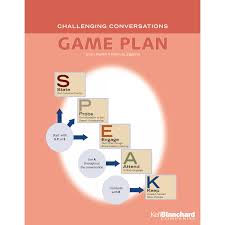Click here to return to Blog Post Intro
According to Eryn Kalish and Pat Zigarmi, coauthors of The Ken Blanchard Companies’ Challenging Conversations Training Program, managers must be on guard against “withdrawing from a situation” (the avoidance syndrome) instead of confronting it directly. Pat Zigarmi explaines, “When managers avoid a sticky situation, it usually escalates. It gets stickier and messier and more complex. Both parties feel guilty, threatened, and resentful.” The result is damaged relationships and damaged projects, decreased motivation, creativity, and energy.
Myth Busting
The Challenging Conversations Training Program dispels some significant myths:
#1 – The best thing is to be objective and stick to the facts.
Many times during a challenging conversation, our feelings surface whether we want them to or not. Feelings are a component of any situation whether it’s personal or professional. I once heard a leader quip, “I don’t do feelings.” Unfortunately, that leader limited his own personal effectiveness. A Joe Friday “Just the Facts” approach can block the opportunity to deal with both thoughts and emotions. Recent research reveals that people often harden their positions when only dealing with the facts anyway. To effectively deal with a difficult situation, we need to talk about our feelings and reactions in a healthy way and without blaming the other person.
#2 – If you show empathy, it means you agree with the other person’s point of view.
There is a difference between empathy and agreement. Using phrases such as “I understand what you’re feeling, but I have a different perspective” allows you to honor the person’s point of view without yielding to it. While it’s difficult to acknowledge the other person’s point of view when you’re angry or hurt, you can try to detach personally from what’s being said to minimize defensiveness and optimize empathy in a way that inspires trust.
#3 – If you address issues openly, you’ll damage relationships.
As Kalish explains, “Many managers feel they lack the skills to navigate the process successfully, so they choose to avoid the problem and hope it clears up on its own. It rarely does.”
It should be noted that neither “fight” nor “flight” really works in challenging conversation. Kalish points out, “You want to state your deep truth, and also listen to the other’s deep truth, with an open, engaging, curious orientation and a willingness to resolve something in a way that works for all stakeholders.”
Types of Conflict
Conflict generally occurs regarding:
- Different interpretations of facts or information
- Lack of clear goals
- Unclear processes or procedures
- Issues over ownership and control
- Low trust or broken relationships
- Diverging values
The first four issues can be addressed through good management—clarifying goals, roles & responsibilities, and understanding intent. The last two can get very personal since they deal with our relationships & values.
How to Win
OK, so that subtitle isn’t going to help you manage conflict effectively! Many of us have difficulty getting beyond the win/lose mindset, which makes it even tougher to really trust the conflict management process…
Kalish recommends a five-step process:
- State your concerns directly
- Probe for more information from the other person
- Engage people by really listening with your full heart
- Attend to their body language
- Watch for cues by tuning in at a subtler level and keeping forward focused to resolve the situation
One of the greatest skills leaders can build is the art of listening well—to listen to themselves and their instincts about difficult situations and to the other person in order to really understand their point of view and perspective.
For leaders willing to step up to the challenge, the results can be far-reaching, including quicker resolution of performance issues, better work relationships, reduced tension, and yes, greater creativity! May your conflict management skills serve you well as you shoot for the stars!


